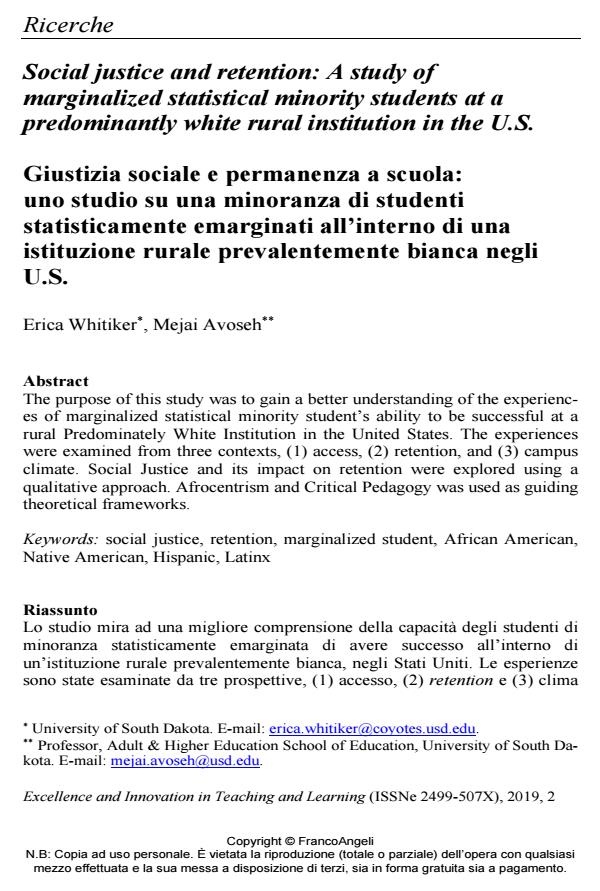Social justice and retention: A study of marginalized statistical minority students at a predominantly white rural institution in the U.S.
Journal title EXCELLENCE AND INNOVATION IN LEARNING AND TEACHING
Author/s Erica Whitiker, Mejai Avoseh
Publishing Year 2019 Issue 2019/2
Language English Pages 17 P. 5-21 File size 283 KB
DOI 10.3280/EXI2019-002001
DOI is like a bar code for intellectual property: to have more infomation
click here
Below, you can see the article first page
If you want to buy this article in PDF format, you can do it, following the instructions to buy download credits

FrancoAngeli is member of Publishers International Linking Association, Inc (PILA), a not-for-profit association which run the CrossRef service enabling links to and from online scholarly content.
The purpose of this study was to gain a better understanding of the experiences of marginalized statistical minority student’s ability to be successful at a rural Predominately White Institution in the United States. The experiences were examined from three contexts, (1) access, (2) retention, and (3) campus climate. Social Justice and its impact on retention were explored using a qualitative approach. Afrocentrism and Critical Pedagogy was used as guiding theoretical frameworks.
Keywords: Social justice, retention, marginalized student, African American, Native American, Hispanic, Latinx
- Aston, C. & Graves, S. (2016). Challenges and barriers to implementing a schoolbased Afrocentric intervention in urban schools: A pilot study of the sisters of Nia cultural program. School of Psychology Forum: Research in Practice, 10(2), 165-176.
- Brookfield, S. D. (2010). Theoretical frameworks for understanding the field. In C. E.
- Kasworm, A.D. Rose, & J. M. Ross-Gordon. (Eds.). Handbook of adult and continuing education (pp. 71-81). Thousand Oaks, CA: Sage Publications Inc.
- Cerezo, A., McWhirter, B. T., Pena, D., Valdez, M., & Bustos, C. (2013). Giving voice: utilizing critical race theory to facilitate consciousness of racial identity for Latina/o college students. Journal for Social Action in Counseling and Psychology 5(3), 1-24.
- Creswell, J. W. (2007). Qualitative inquiry and research design: Choosing from five approaches (2nd ed.). Thousand Oaks, CA: Sage Publications, Inc.
- Davis, T. & Harrison, L. M. (2013). Advancing social justice. San Francisco, CA: Jossey-Bass.
- Fleming, T. (2012). Habermas, Critical Theory and Education. -- Retrieved from: https://www.researchgate.net/publication/286459379_Habermas_Critical_Theory_and_Education.
- Freire, P. (2018). Pedagogy of the oppressed (50thth Anniversary Edition). New York: Bloomsbury Academy.
- Gay, G. (2002). Preparing for culturally responsive teaching. Journal of Teacher Education, 53, 106-16.
- Harris, F. (1999). Centricity and the mentoring experience in academia: An Africentric mentoring paradigm. The Western Journal of Black Studies, 23(4), 229-235.
- Hatter, D. Y. & Ottens, A. J. (1998). Afrocentric world view and black students’ adjustment to a predominantly white university: Does worldview matter? College Student Journal, 32(3), 1-9.
- Healey, J.F., Stepnick, A., & O’Brien, E. (2018). Race, ethnicity, gender, and class: The sociology of group conflict and change (8th ed.). Thousand Oaks, CA: Sage Publications.
- Huffman, T. (2001). Resistance theory and the transculturation hypothesis as explanations of college attrition and persistence among culturally traditional American Indian students. Faculty Publications- School of Education. -- Retrieved from: http://digitalcommons.georgefox.edu/soe_faculty/107.
- Hurd, N. M., Tan, J. S., & Loeb, E. L. (2016). Natural mentoring relationship and the adjustment to college among underrepresented students. Am J Community Psychology, 57, 330-341.
- McClain, K. S. & Perry, A. (2017). Where did they go: retention rates for students of color at predominately White institutions. College Student Affairs Leadership, 4(1), 1-11.
- Ness, M. K., George, M. A., Turner, K. H., & Bolgatz, J. (2010). The growth of higher education for social justice: Collaborative professional development in higher education. Sight: A Journal of Scholarly Teaching, 88-100.
- Solorzano, D. G., Ceja, M., & Yosso, T. J. (2000). Critical race theory, racial microaggressions, and campus racial climate: the experience of African American college students. The Journal of Negro Education, 69(1), 60-74.
- South Dakota Board of Regents. (2019). Fact Book. -- Retrieved from: https://www.sdbor.edu/mediapubs/factbook/Documents/FY19_FactBook.pdf.
- Tachine, A. & Francis-Begay, K. (2013). First-year experience for Native American freshmen. In Shotton, H. J., Lowe, S. C. & Waterman, S. J. (2013). Beyond the asterisk: Understanding Native students in higher education (pp. 25-38). Sterling, Virginia: Stylus Publishing, LLC
Erica Whitiker, Mejai Avoseh, Social justice and retention: A study of marginalized statistical minority students at a predominantly white rural institution in the U.S. in "EXCELLENCE AND INNOVATION IN LEARNING AND TEACHING" 2/2019, pp 5-21, DOI: 10.3280/EXI2019-002001